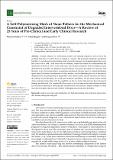A Self-Polymerizing Mesh of Nano-Tethers for the Mechanical Constraint of Degraded Intervertebral Discs—A Review of 25 Years of Pre-Clinical and Early Clinical Research
Author(s)
Hedman, Thomas; Rogers, Adam; Beall, Douglas
Downloadbioengineering-11-00535.pdf (4.675Mb)
Publisher with Creative Commons License
Publisher with Creative Commons License
Creative Commons Attribution
Terms of use
Metadata
Show full item recordAbstract
Genipin polymers are self-forming tensile-load-carrying oligomers, derived from the gardenia fruit, that covalently bond to amines on collagen. The potential therapeutic mechanical benefits of a non-discrete in situ forming mesh of genipin oligomers for degraded spinal discs were first conceived in 1998. Over more than two decades, numerous studies have demonstrated the immediate mechanical effects of this injectable, intra-annular polymeric mesh including an early demonstration of an effect on clinical outcomes for chronic or recurrent discogenic low back pain. This literature review focused on articles investigating mechanical effects in cadaveric animal and human spinal discs, biochemical mechanism of action studies, articles describing the role of mechanical degradation in the pathogenesis of degenerative disc disease, initial clinical outcomes and articles describing current discogenic low back pain treatment algorithms. On the basis of these results, clinical indications that align with the capabilities of this novel injectable polymer-based treatment strategy are discussed. It is intended that this review of a novel nano-scale material-based solution for mechanical deficiencies in biologically limited tissues may provide a helpful example for other innovations in spinal diseases and similarly challenging musculoskeletal disorders.
Date issued
2024-05-24Journal
Bioengineering
Publisher
MDPI AG
Citation
Hedman, T.; Rogers, A.; Beall, D. A Self-Polymerizing Mesh of Nano-Tethers for the Mechanical Constraint of Degraded Intervertebral Discs—A Review of 25 Years of Pre-Clinical and Early Clinical Research. Bioengineering 2024, 11, 535.
Version: Final published version
ISSN
2306-5354